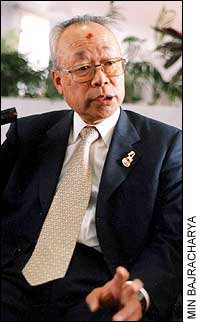Yoshio Ishizaka, executive vice president of Toyota, was in Nepal recently to promote the company, inaugurate a new venture in the capital and to show his company's concern for the environment. Excerpts of his talk with Nepali Times:
 What is the main purpose of your visit to Nepal?
What is the main purpose of your visit to Nepal?
Our main purpose is to inaugurate the 3S facility started by United Trade Syndicate and also to celebrate the launch of the new Corolla. The 3S facility is sales, after sales service and spare parts. We are also going to the zoo for future projects in supporting Nepal's biodiversity. .
What exactly is Toyota's market strategy in Nepal?
United Trade Syndicate has been handling our business for the past 37 years. Our job is to cooperate with them and offer our best products. Although the size of the market is small, we are established here now and loved by the people of Nepal. We are here to conserve Nepal's beauty and environment and to talk about future cooperation.
Given tough global competition, how does Toyota intend to stay ahead?
The global economy is contracting a bit, but we have a wide range of products and we are old players in the global economy. What we do is look after our own customer base and to cater the new customer on worldwide scale. We sold almost 6 million vehicles last year and we are third after next General Motors and Ford. We like to expand our business constantly. Since the company started in 1937, we have gone through ups and downs. We experienced the adverse effects of World War II, and became bankrupt. America controlled the Japanese economy and we had no material for labour. We were restricted to making lunch boxes and trucks. But then the economy bounced back and our growth paralleled the rise of the Japanese economy
What has been your company's response to climate change due to the greenhouse effect?
The Japanese government has already endorsed the Kyoto Protocol. Of course, we have to wait for the US to join. It is very important to preserve nature otherwise, in a 100 years time the problem will get out of hand. Preserving the environment is very important to us. This year I was asked to go to the World Economic Forum Conference at Davos to represent Toyota and attend the automobile governers forum representing the company. There we discussed a sustainable society for the future.
What are some of the specific programs you discussed there?
We are developing environment friendly vehicles. The first one is a Toyota Hybrid car. The Hybrid has a gasoline motor. It is marketed worldwide. It is very well known among the Japanese public and the Americans. The ultimate eco-cars are called fuel-saving vehicles and we recently launched them in Japan and the US. We are frontrunners in environmental technology. Today, Toyota is the number one in hybrid car technology in the world.
At the same time, we have a special project to grow trees in Australia, where we have a farm. It is a long-term project in order to reduce fuel emission gases. We have to do positive things. In Indonesia we grow potatoes that can be used as bases for plastic. Of course it's organic. This means after the car component has outgrown it's usefulness, it is biodegradable. Normal plastic has to be burnt, thrown or recycled. Ours is a bio-technological plant. Very soon we are going to adopt it as automobile material.
So, you believe the automobile industry still has a future?
There are so many people who do not necessarily receive the benefit of driving cars. In advanced countries, there is one car for two buses on the road. Our aim is to increase automobile penetration in every country where we do business.
Why did Toyota enter Formula 1 racing?
That has two purposes. One is to explore our technology in terms of engine and chassis development. Motor sport is one extreme of the motor company where we can test-run many things, especially the speed, chassis and engine development, and aerodynamics. Secondly this enhances our image. It's a pleasure for people to watch motor sports. They are the ones who appreciate driving cars with high power.
A lot of car companies are merging. Is that going to happen to Toyota, too?
At this stage, there are no such plans. We can stand on our own. Of course Daihatsu and Hino are our two subsidiaries. We, the Toyota group, can stand our own in the worldwide business, there is no need to merge with anyone else.
Do you think it can sustain brand loyalty?
Definitely. We would like to have 15 percent of the worldwide market share in automobiles. Currently we have around 10 percent. We aim to see a 15 percent growth starting from 2010. Probably then we can beat GM and Ford to become number one.


